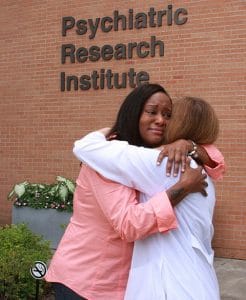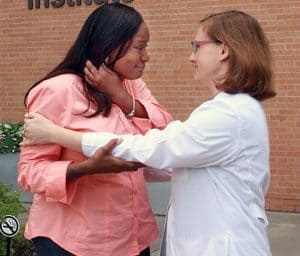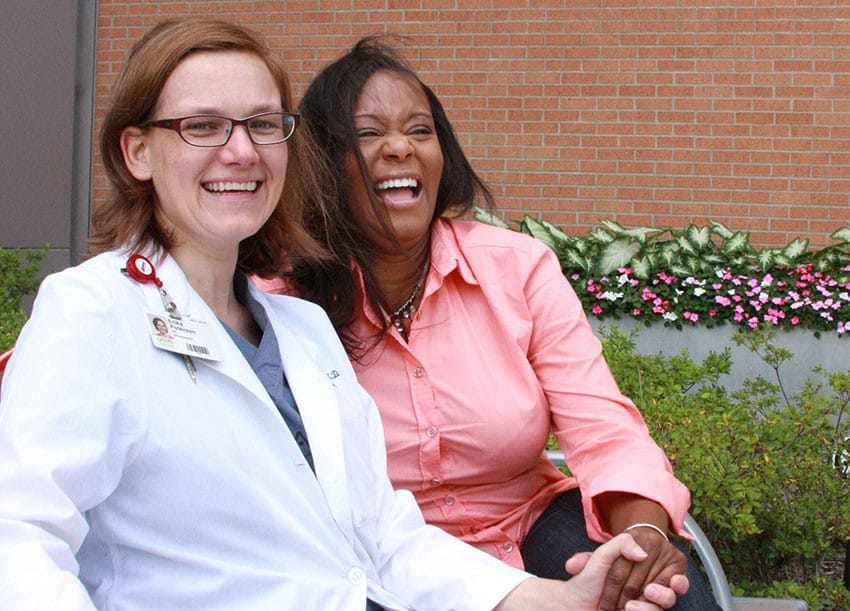Deep Brain Stimulation Relieves Patient’s OCD Symptoms
| July 20, 2015 | Thomasine Williams of Sherwood was constantly washing her hands and arranging and rearranging items. She was unable to go anywhere in public without taking a towel to sit on. She balked at opening doors and using silverware at restaurants.

Psychiatric Research Institute’s Erick Messias, M.D. and Thomasine Williams share a fun moment in the PRI. Dr. Messias diagnosed Thomasine with OCD in 2010.
A mother of two, she first noticed her obsession with cleanliness when her children were young. Her home was cleaned extensively on a daily basis; even the family dog was subjected to a bath three times a week. A nursing student, she eventually lost a job as a waitress because of her inability to work in a setting surrounded by people.

The doctor-patient bond between Thomasine and Dr. Petersen is strong. “I’m so grateful” said Thomasine.
These symptoms are common with people who have obsessive-compulsive disorder (OCD), a diagnosis shared by some 2.2 million Americans, according to the American Psychiatric Association.
After years of enduring the fears and complications that accompanied her disorder, Williams sought help in 2010 at UAMS’ Psychiatric Research Institute.
Erick Messias, M.D., of the institute’s Walker Family Clinic, said the fact that Williams was sitting on her towel in the clinic’s lobby the first time he met her, and that she was unable to even shake his hand, indicated that her disorder was serious.
Messias initially prescribed medications and cognitive therapy, which helps patients try to change their thoughts, feelings and behaviors, in an effort to keep her compulsions from overwhelming her. After a year with little success, Messias believed Williams was most likely not going to get any better; that she suffered from a rare form of OCD that was resistant to treatment.
He determined she was a likely candidate for a surgical procedure involving deep brain stimulation (DBS), which is widely used for Parkinson’s disease but only had been used in a limited number of cases throughout the country for patients whose OCD didn’t respond to medication.
“Deep brain stimulation involves specific areas of the brain being electrically stimulated through electrodes that are surgically implanted,” said Messias.

The meeting between Thomasine and Erika Petersen, M.D. was an emotional one. Dr. Petersen performed the deep brain stimulation surgery. They have both worked hard at improving Williams’ OCD symptoms.
He had studied extensively about the procedure but had only seen one other case at UAMS that used it to treat a patient with OCD. He consulted with Erika Petersen, M.D., an assistant professor in the UAMS College of Medicine’s Department of Neurosurgery, about the possibility of treating Williams with deep brain stimulation by implanting electrodes in her brain in hope of relieving her symptoms.
“We know that in some of the circuits in the brain, there’s a connection of four or five different stations along the route,” Petersen said, “Deep brain stimulation targets one of those stations along the route and creates an electrical force field that prevents signals from crossing. By changing the way the signals are going around that circuit, it sort of reregulates.”
Petersen and Messias talked about the procedure with Williams, who underwent a series of neuropsychological tests to determine whether she was a good candidate for the surgery. She met with faculty members from the Department of Psychiatry and the Department of Neurology about possible outcomes of the surgery, and talked with family and friends before realizing that her only hope of getting better was undergoing the procedure.
The surgery, which took place in June 2014, included placing a battery pack under the skin to keep the electrical current coursing to her brain. UAMS is one of only 20 or so hospitals around the country that have performed the procedure, which will require replacing the battery pack when it wears out in two years.
A year after her surgery, Williams has shown dramatic improvement in her OCD symptoms, from being unable to even touch others to openly embracing her caregivers. “She went from not touching my hand to giving me a hug,” Messias said.
She still has difficulty in using public restrooms, and her family members still remove their shoes on entering her home for fear of bringing in dirt or germs, but Williams feels she has made great strides in overcoming her disorder.
She attended her grandson’s first birthday party without bringing along hand sanitizer, a first for her, and has even begun administering wound care to an elderly patient with skin cancer. She hopes to complete her education requirements in the coming year to obtain her nursing degree, possibly at UAMS.
As for the towel she sat on everywhere she went? She has put it away, hopefully for good.

